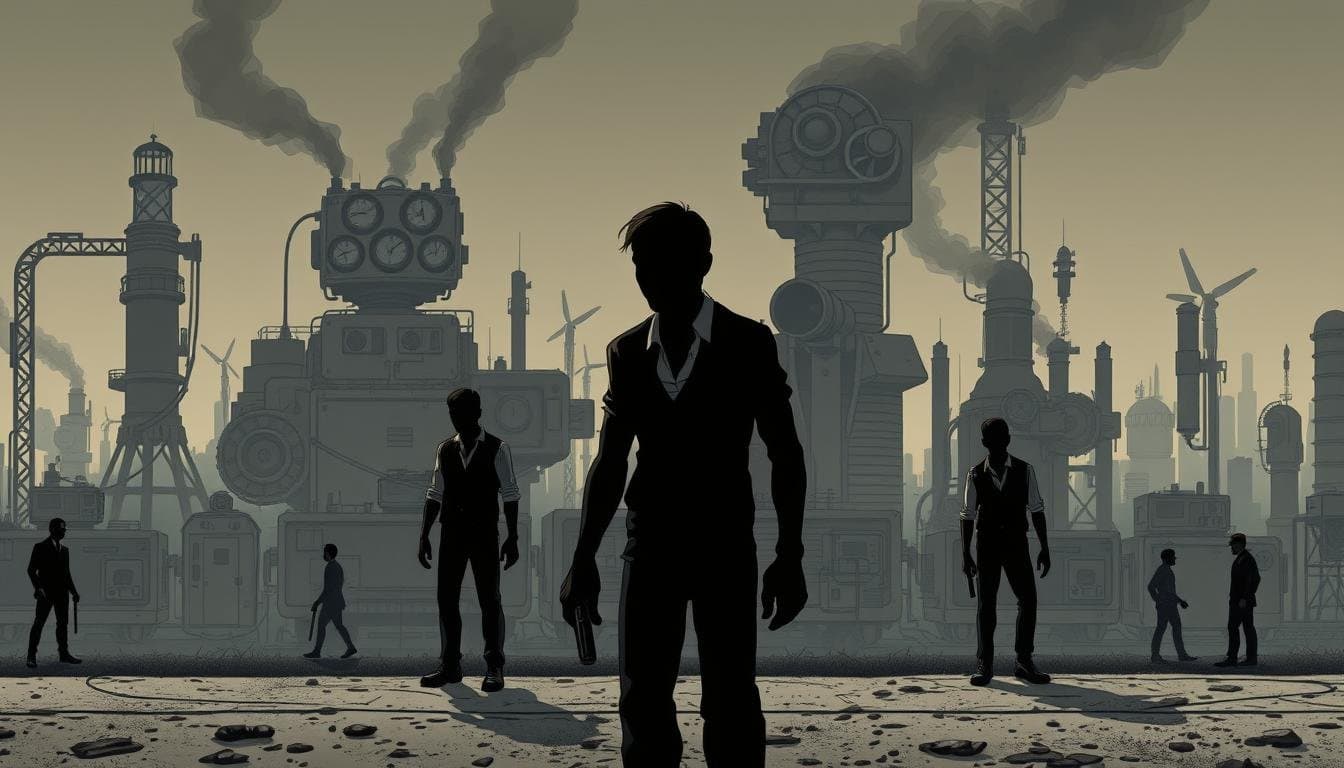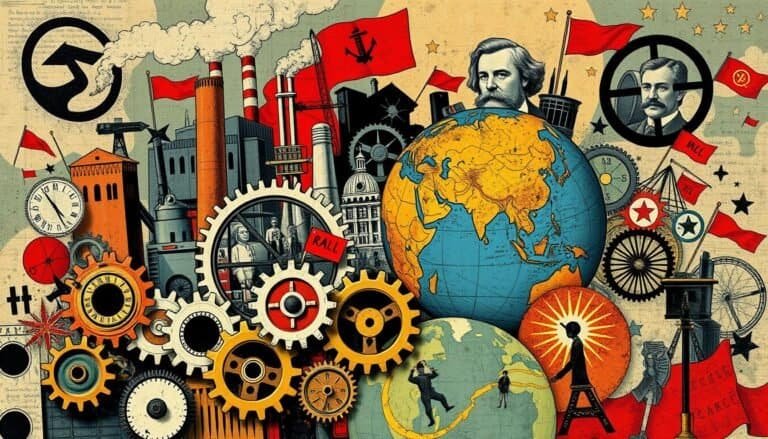The Concept of Alienation in Marxist Philosophy
Have you ever felt out of touch with your job or the things you make? This question leads us to the core of the Concept of Alienation in Marxist Philosophy. Karl Marx first brought up this idea. He showed how people feel disconnected from their work and the things they make. This feeling affects not just workers but also challenges the capitalist system.
In this article, we’ll explore where alienation comes from, its different types, and how it changes society and our sense of self. We’ll see how deeply this idea is part of our lives today.
Key Takeaways
- The term “alienation” has origins in both Hegelian and Marxist thought.
- Alienation represents a problematic separation between subjects and objects, impacting individual and collective experiences.
- Karl Marx identified alienation in labor as a disconnect between workers and the products of their work.
- Under capitalism, workers experience alienation from themselves, their labor, and their fellow workers.
- Understanding alienation can help us analyze our roles in the workforce and societal structures.
Understanding Alienation and Its Roots
Alienation helps us see how we feel disconnected from ourselves and society. It has a deep history, leading to a clear definition. Looking into its roots shows how it affects us in many ways, socially and economically.
Definition of Alienation
The core idea of alienation is feeling apart from our work, society, and ourselves. This feeling comes from losing control over what we make. Instead, what we create belongs to a few who own the means to make things.
This shows alienation is a key part of how capitalism works. It’s not just about feeling bad; it’s a real structure of our experience.
Historical Context of Alienation Theory
The story of alienation theory goes back to old philosophical thoughts and the Industrial Revolution. Thinkers like Hegel and Feuerbach helped us see how the economy makes us feel disconnected. Karl Marx built on these ideas, especially in “Economic and Philosophic Manuscripts of 1844.”
He linked alienation to a bigger fight between idealism and economic facts. Christianity and Judaism also touch on this idea, seeing it as part of a struggle.
Important points about alienation include:
- Capitalism makes producers feel separate from what they make.
- Alienation is a real structure that affects our lives and leads to forced labor.
- Alienation has a long history in European thought, showing deep social issues.
The Concept of Alienation in Marxist Philosophy
Karl Marx looked deeply into alienation, a key part of his critique of capitalism. He showed how workers lose touch with their work, their sense of self, and their social ties. This alienation shows the effects of capitalist social structures.
Marx’s ideas need us to see the complex layers of alienation. Each layer shows a different way in which work under capitalism is oppressive.
Karl Marx’s Exploration of Alienation
In his early work, Marx explained alienation as a social issue. He said that under capitalism, work becomes just a way to survive. This makes people lose touch with their true nature.
Workers are disconnected from what they make, leading to a gap between their personal goals and economic needs. This view is different from Hegel’s, which focuses on how the self grows and changes.
Connection to Society and Capitalism
As capitalism grows, Marx’s ideas on alienation become more clear. Capitalism makes relationships more about deals than connections. Experts like David Leopold and Erich Fromm see alienation as a big gap between us and others.
Recent studies show how much of our lives today feels alienated. This highlights the ongoing effects of alienation in our world.
| Aspect | Details |
|---|---|
| Basic Definition | Separation from products, labor process, self, and fellow humans |
| Influence of Hegel | Contributions to understanding alienation through dialectics |
| Connection to Reification | Lukács popularizes reification in context to alienated relationships |
| Contemporary Relevance | Research highlights rising alienation in society and its implications |
| Key Scholars | Anita Chari, Axel Honneth, Jahel Raeggi, and others |
Marx’s idea of alienation is still important today, especially with the problems caused by capitalist production. It helps us see how capitalism affects people and society.
Forms of Alienation in Marx’s Theory
Karl Marx looked into alienation and found four main types. Each type shows how capitalism affects people, making their work, identity, and social life worse. This leads to big problems for workers.
Alienation from the Product of Labor
Workers feel cut off from what they make. Marx said they don’t own their work, making them feel like objects. This makes them unhappy with their work and feel poor inside.
The things they make end up belonging to others. This shows a big gap between the worker and their work.
Alienation from the Activity of Labor
The second type is about the work itself. Instead of being creative and meaningful, work just helps people survive. This turns work into a chore, not a chance to show what you can do.
People see work as a burden, not a key part of who they are. This makes them unhappy and disconnected from their work.
Alienation from Oneself
This type is about losing your sense of self at work. The market’s demands take over, making people lose their unique identity. This leads to feeling sad and ashamed as they try to fit in, not follow their own dreams.
Alienation from Others
The last type is about feeling alone in social situations. In capitalist societies, people compete instead of working together. This breaks down real connections, making everyone feel more isolated in both work and personal life.
These forms of alienation show how capitalism affects workers. They make people see how the system changes their lives. It encourages them to think deeply about their work and social situation.
Alienation and Capitalism
Looking at Alienation and Capitalism shows how capitalist production changes labor. Workers often feel cut off from the things they make. This happens because their work is turned into a product to be sold.
Workers become just parts of a big machine. A few people control the production, making a big gap between the rich and the poor. This leaves workers feeling helpless.
Capitalist Production and Labor
Capitalist production focuses on making things fast and cheap, not on making workers happy. It moves from skilled craftsmanship to assembly line work. Workers do one task over and over, feeling unconnected to their work.
This makes them feel unfulfilled. They lose the chance to change their work or improve their conditions. They feel like they don’t matter in what they make.
The Role of the Means of Production
In capitalist societies, who owns the means of production is key to alienation. A few own most of it, making workers feel far from their work and its results. They feel small and powerless, adding to their sense of meaninglessness at work.
This can make workers unhappy with their jobs. They might feel like they’re not doing anything meaningful. Alienation in capitalism can really affect how happy people are with their lives.
Impact on Workers’ Lives
Alienation touches many parts of a worker’s life. Feeling unhappy with their job can make them feel unfulfilled. They might feel like they’re missing out on things they need.
Feeling disconnected from their work can make people feel bad overall. It shows how alienation in capitalist systems affects workers deeply.
| Aspect | Impact of Capitalism | Consequences for Workers |
|---|---|---|
| Control over production | Concentrated among capitalists | Powerlessness and insignificance |
| Type of labor | Commodification of work | Loss of personal fulfillment |
| Job satisfaction | Decreased due to alienation | Increased feelings of deprivation |
| Worker engagement | Marginalized in corporate structures | Lack of commitment to the organization |
Marxian Theory of Alienation Explained
The Marxian Theory of Alienation looks at how people relate to the economic systems that shape their lives. It focuses on Entfremdung, or how workers lose touch with their work, the things they make, their coworkers, and their true selves. This idea helps us understand Marx’s view of capitalist societies and their effects on people and work.
Entfremdung in Marx’s Philosophy
Entfremdung is key to Marx’s study of society. He believed that moving to private property and market systems in places like Poland, Hungary, and the USSR made things worse. Workers just become machines to make more value, leading to a loss of their humanity. Marx thought that everything’s value comes from the work put into it, a view shared by Adam Smith and David Ricardo. But, this idea was mostly ignored by economists by the late 1800s.
Philosophical Foundations of Alienation Theory
The ideas behind Marx’s Alienation Theory come from combining Hegel’s ideas with Marx’s own views. Marx moved past Hegel’s focus on freedom and religion to look at the real-world causes of alienation. He showed how capitalism uses workers for its own gain, taking away their ability to create freely. Marx believed in a future where people could be free from capitalist control, showing that humans could be saved from this system.
| Aspect | Description |
|---|---|
| Entfremdung | The estrangement of individuals from their labor, products, and fellow beings. |
| Labor Theory of Value | The concept that value is derived from labor, highlighting exploitation in capitalist societies. |
| Philosophical Foundations | Integration of Hegelian dialectics and Marx’s materialism, focusing on societal structures. |
| Impact of Capitalism | Capitalist systems create alienation through labor exploitation and loss of human essence. |
Social Alienation in Modern Context
Social alienation today is complex, with people’s connections deeply affected by technology. Social media has sparked debates on its impact on relationships. It often makes people feel more alone, even when they’re connected online.
Alienation in Contemporary Society
Social alienation shows up in many ways today, similar to Marx’s time. People struggle to find happiness in a world built on capitalism. They feel cut off from their true nature and the work they do, making them feel less human.
Workers also feel separated from what they produce, adding to their sense of disconnection. This mirrors Marx’s ideas about alienation in work.
Social Media and Alienation
Social media is a big part of how we connect today. But, it can make relationships feel shallow. People often try to show a perfect life online, hiding their true selves. This can make real connections hard to find.
Workers may feel powerless, seeing their efforts as small against big social forces. This feeling of powerlessness is similar to what Marx described as alienation.
| Aspect of Alienation | Description |
|---|---|
| Alienation from Product | Workers feel disconnected from their labor outcomes due to capitalist ownership. |
| Alienation from Process | Detachment from the act of production, resulting in mechanical and unfulfilling labor. |
| Alienation from Self | The disconnect between personal identity and performance in work environments. |
| Alienation from Others | Strained relationships among workers undermined by competition and mistrust. |
Effects of Alienation on Labor
The idea of alienation deeply affects how people work, leading to big changes in their lives. It goes beyond just doing a job well. It touches on our dignity and feeling fulfilled at work.
The Dehumanization of Workers
In a capitalist system, workers lose their identity and freedom. They do tasks that feel forced, without feeling they own them or enjoy them. This makes work feel empty, only done to please others, not for personal goals.
Workers are seen as just parts of a big machine. Their work is often seen as less important and ignored.
Psychological Impact of Alienated Labor
Alienated labor has big effects on our minds. It can make people feel anxious and depressed. Not feeling connected to what we do stops us from growing personally.
Doing work that doesn’t give us meaning can drain our energy and make us less motivated. Feeling apart from our work and colleagues makes us feel lonely and unhappy.
| Impact Factor | Effect on Workers | Consequences |
|---|---|---|
| Dehumanization | Feeling like a cog in the machine | Lack of job satisfaction, disengagement |
| Alienation from Labor | Loss of connection to output | Lower self-esteem, burnout |
| Emotional Exhaustion | Ongoing anxiety and depression | Increased turnover rates, health issues |
Understanding alienation helps us see why we need to change work places. We need to make them more meaningful and welcoming for everyone.
Critiques and Alternatives to Marx’s Alienation
Marx’s theory of alienation has faced a lot of philosophical debate. Scholars from different fields have looked closely at its limits. They wonder how much control people have in a capitalist world. This has led to important discussions about Marx’s ideas on human relationships and the economy.
Philosophical Critiques of Alienation Theory
Some argue that Marx’s focus on the economy is too narrow. They say it doesn’t capture the full picture of alienation. Critics believe his view doesn’t consider all the things that affect people’s lives. They argue that focusing too much on economics takes away from our ability to make choices.
This leads to a deeper look at how we connect with each other. It shows that Marx might not fully understand human relationships.
Alternative Views on Alienation
There are other ideas that challenge Marx’s theory. These ideas come from existential and postmodern philosophies. They offer new ways to think about alienation that go beyond just the economy.
These views suggest ways to take back control and build stronger connections with others. They stress the need for social well-being in dealing with alienation.
The following table illustrates some key comparisons between critiques of alienation and alternative views:
| Aspect | Critiques of Alienation | Alternatives to Marx’s Theory |
|---|---|---|
| Focus | Economic determinism | Interpersonal and social factors |
| Agency | Lack of individual agency | Reclaiming individual agency |
| Human Connection | Oversimplified view | Emphasis on authentic relationships |
| Scope | Primarily centered on capitalism | Includes existential and cultural dimensions |
Conclusion
The idea of alienation is key in discussions about society and economics. It connects Marxist ideas with today’s world. Alienation deeply affects workers, taking away their fulfilling lives under capitalism.
Workers feel powerless, frustrated, and anxious. This mirrors what Rousseau and Marx said about modern society being corrupt. Alienation shows how disconnected we are from our true human experiences. It calls for a new look at how we view work.
Marx talks about the struggles of the working class under capitalism. He argues that big changes are needed. In today’s jobs, like call centers, many workers feel trapped and disconnected from their work. This makes them feel not good enough.
This alienation harms not just workers but also society as a whole. It leads to health issues and social problems.
In conclusion, understanding alienation helps us work on building better relationships among workers. It pushes for a fairer society. We need to keep exploring these ideas to fix the problems caused by capitalism. This could lead to a society where workers have more control and everyone’s life improves.
Source Links
- Alienation
- Marx’s theory of alienation
- Karl Marx’s Conception of Alienation
- Asher Horowitz | Department of Political Science | Faculty of Liberal Arts and Professional Studies
- I. Origins of the Concept of Alienation
- Alienation and Marxism: An Alternative Starting Point for Critical IR Theory
- Is Marx’s concept of alienation in conflict with his materialism?
- Soc 250 – Marx on Alienation
- Marx’s Theory of Alienation by Meszaros
- Marx’s Theory of Alienation In Sociology
- For Karl Marx, Alienation Was Central to Understanding Capitalism
- Marxism – Econlib
- Microsoft Word – The Unity of Marx’s Concept of Alienated Labor.docx
- Soc 250 – Marx on Alienation
- Revisiting Marx’s Concept of Alienation – Marcello Musto
- ‘Alienation: An Introduction to Marx’s Theory’ reviewed by Daniel Herbert
- Alienation: A useful concept for health inequality research







